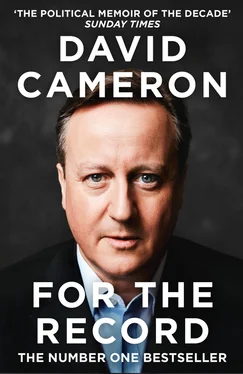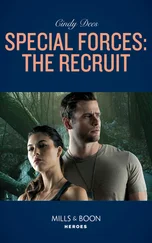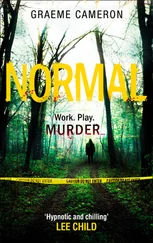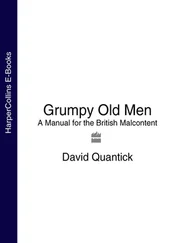1 ...6 7 8 10 11 12 ...20 There were Liz Sugg and Gabby Bertin, who had got me from A to B, fended off the press and made everything happen over the past five years. Laurence Mann, Kate Marley and Tim Chatwin had served me loyally for much of my leadership, and they were there too.
I made my way to the microphone stand in front of the famous black door. As on many previous occasions, I was going to deliver my words without notes.
‘Compared with a decade ago, this country is more open at home and more compassionate abroad,’ I began, wanting to strike a different, magnanimous tone by paying tribute to the good things Labour had achieved. ‘I think the service our country needs right now is to face up to our really big challenges,’ I went on, bracing people for the measures that were urgently needed to fix the economy. ‘Real change is not what government can do on its own. Real change is when everyone pulls together.’ This was the Big Society, the idea from which all our reforms would flow, being put front and centre of our programme. And I finished with a defining principle: ‘Those who can, should, and those who can’t, we will always help.’ I had come up with this earlier, while talking with Steve. I would end up using it as a guide for much that I tried to do in that building, repeating it in my head like a mantra during those lonely moments when I was forced to make the most difficult decisions about people’s lives.
Sam and I stepped through the big black door, passing between the civil servants lining the hallway and applauding – the traditional ‘clapping in’ – as we walked through to the prime minister’s office. I felt exhausted, elated – but strangely at ease.
Not at ease in an entitled, born-to-rule sense. But because there is such a warmth from all the people in that building – and, for me, at least some familiarity. I’d been in No. 10 in my twenties as a young researcher and a special adviser. I had returned in my thirties for briefings on urgent issues as an MP and leader of the opposition. Now I was back, aged forty-three, as the youngest prime minister since Lord Liverpool in 1812.
But it was time to return to the 1922. As our backbench MPs clustered in the huge committee room, Samantha and I were led in by Patrick McLoughlin. ‘Colleagues, the prime minister,’ he said. There was an eruption of clapping, stamping and cheering.
Afterwards, I went back to my Commons office to thank the wider team.
I never did go back into the Shadow Cabinet Room.
In many ways, those five days in May were the most surreal and tense of my five years as opposition leader. But looking back, some of the things that looked as if they would hinder our path to power actually smoothed the way.
Take Nick Clegg. During the election campaign he had seemed like a big obstacle: the insurgent with a message of change. But the fact that we had similar temperaments and values, and were thinking the same way when crunch time came, meant that we were able to form this historic union when we had to.
And take Gordon Brown, with his determination to cling on in No. 10. While it seemed like another roadblock to us at the time, his stubbornness pushed us harder towards coalition, and bought us time to thrash things out with the Lib Dems. Had he gone straight away, we would have been forced into power in a minority arrangement that could well have failed.
People have since questioned whether I exaggerated the threat of AV being imposed without a referendum in order to get Tory MPs to agree to offer the Lib Dems something on voting reform. The truth is that I was absolutely convinced that Labour had put it on the table. Why wouldn’t they? Brown was willing to sacrifice himself, so surely they were willing to do whatever it took.
Even if they hadn’t offered AV without a referendum, they definitely were offering it with one. We would have had to match that anyway. Eventually it emerged that what had happened was somewhere between the two. Brown had said that, in the circumstances of an AV referendum, he would throw the full resources of Labour behind a ‘yes’ campaign. That was more than I was offering, and perhaps accounts for the confusing signals we were receiving at the time.
I am in no doubt that our flexibility and the concessions we were willing to make, combined with the tone we adopted from the outset, made a huge difference in bringing our two parties together.
In many ways, the boldest move wasn’t the decision to form a coalition; it was the decision to make it work. There would be many difficult arguments and painful compromises to come. Sometimes there were full-on shouting matches and accusations of bad faith. Like all governments we made mistakes and missteps. But it was to prove one of the most stable – and, I would argue, most successful – governments anywhere in Europe. And I never once regretted the course we had taken.
2
So let’s go back to the beginning.
I suppose every child grows up in his or her own world. You think that what you have is just, well, normal. I wasn’t much different. Yet I think I did always know there was something special about it – that I was lucky.
My early years were ones of great privilege and comfort. My parents, Ian and Mary, inherited money and my dad worked hard to make us all comfortable. But the privilege wasn’t solely material – it wasn’t the wealth that determined the happy childhood, but the warmth. My parents and I shared an uncomplicated and unconditional love, and the simple values they taught me – to have respect for others, to understand the responsibility to contribute, or to ‘put back in’, as they would say – remain the cornerstone of my outlook on life.
I was born in London on 9 October 1966, and lived as a small child in Kensington’s Phillimore Gardens. And then, in 1969, my father bought the Old Rectory, Peasemore, in Berkshire, which I’ve always thought of as my family home and still do. My older brother Alex lives there now with his family, and my mother lives in a cottage next door.
The schools I attended read like an English upper-middle-class cliché: Miss Emm’s Nursery School, housed on a nearby country estate, Lockinge, outside Wantage. Greenwood private preparatory school near Newbury. Then Heatherdown – a classic boys’ boarding school, where I went at the age of seven. Then, of course, Eton College. I was following my father, his father and his grandfather … as well as my mother’s father, and his father … you get the picture.
My dad was an extraordinary man, and a huge influence on me. He was born with a pretty odd deformity. Legs that were far shorter than they should have been, no heels and three toes on one foot and four on the other. Sitting down, you would have thought he was well over six foot. Standing up, he was just over five.
Obviously, we children never knew any different, so it didn’t seem odd at all. It was only as we got older that we started to understand what a stigma had been attached to disability when Dad was growing up. I remember the shock when he told me as a teenager that his father Donald was so ashamed about the disability that he had forbidden his wife, Dad’s mother Enid, from having any more children. Much later, my father’s aunt, a wonderfully eccentric woman we called ‘Gav’ – short for Great-Aunt Violet – told us that after Dad was born she had sat outside the hospital room night after night, worried that one of the other relatives would sneak in and ‘snuff him out with a pillow over the head’.
As a result, Dad grew up an only child, with a father who struggled to love him and who would leave his mother for a beautiful Austrian aristocrat, who, just to make things complicated, was married to Great-Aunt Violet’s brother-in-law. None of us children ever met our grandfather. Severely diabetic, possibly depressive and quite probably an alcoholic, he died in 1958.
Читать дальше












